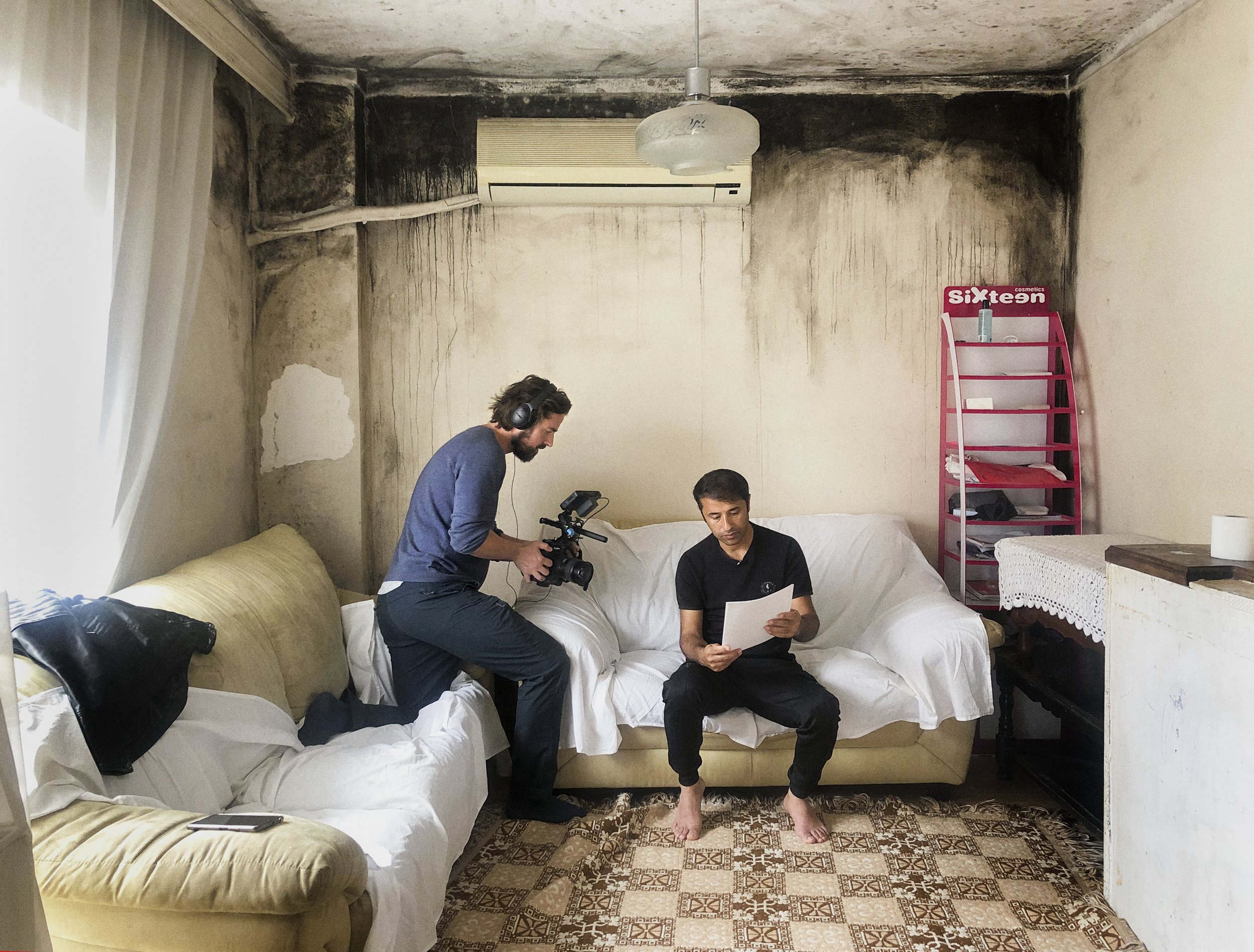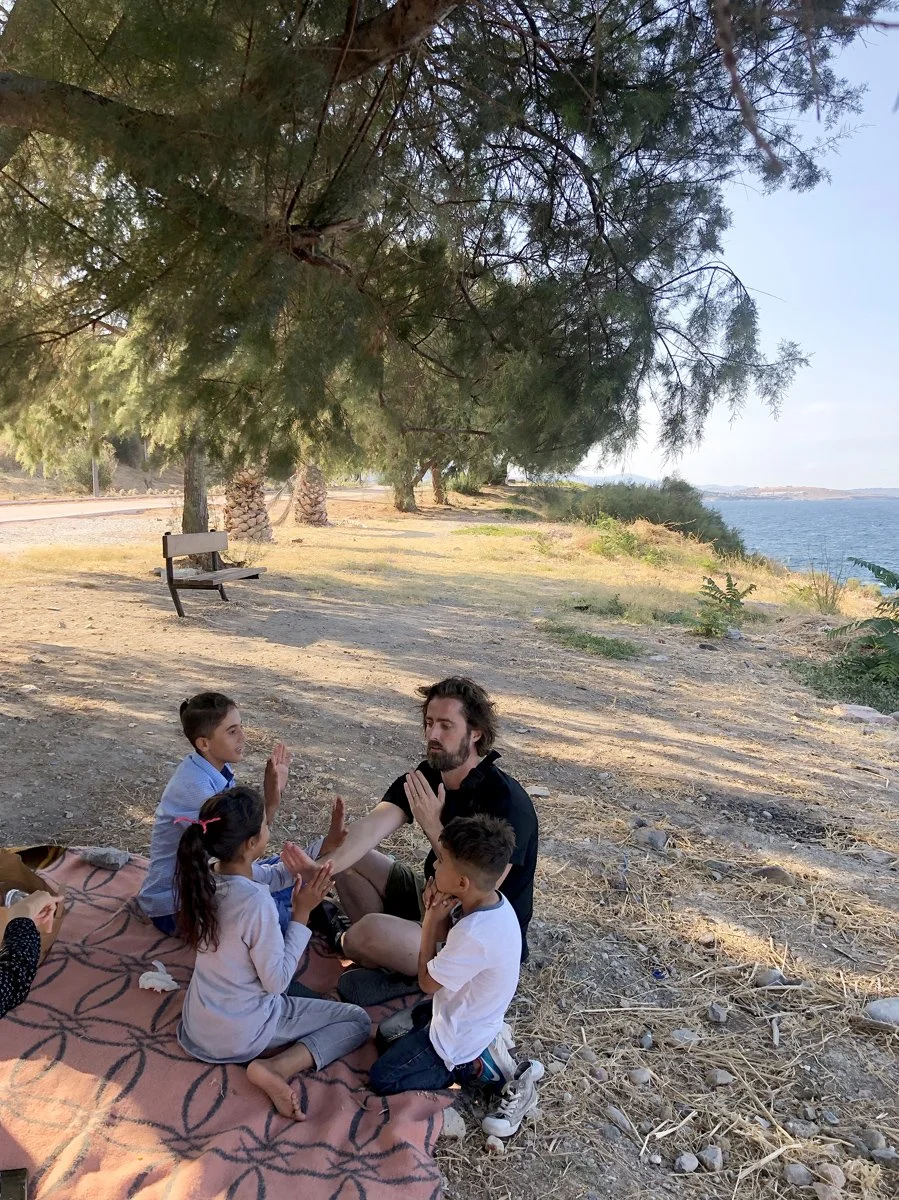
How this project was created
Eight years ago - in August 2015 - we made the documentary 'The Island of All Together' on the Greek island of Lesbos. In this, refugees and tourists met each other on benches and talked about all aspects of their lives. Nearly all the people who took part then arrived relatively easily after a few weeks of traveling through Europe in countries such as Germany, the Netherlands or Sweden. Most of them have since built new lives there.
In the years that followed, on the southern and eastern borders of Europe, we saw increasingly crude methods being used in an attempt to stop the flow of refugees: steel walls, cameras, pushbacks at sea, illegal thugs and sound cannons with the volume of a jet fighter. The documentary project 'Where are the borders of Europe?' (2021) by Daimon Xanthopoulos and Eddy van Wessel painfully reflected this.
One of Eddy’s photos touched us deeply: It was of a girl on her father's shoulders. She was covered in a garbage bag to try stay dry from the rain. We wondered aloud about how this father must feel in these circumstances. What would he tell his child in the evening before falling asleep? That’s when the idea arose of asking parents on the run to write a letter to their child.
Photograph: Eddy van Wessel
-
Being aware of the great sensitivity of the question to write a letter, we first consulted friends who once had fled themselves, colleagues, and Peter Scholten, a doctor who occasionally works in crisis areas for Medical Volunteers International.
We also put our question to Because We Carry, an organization for mothers and children who have had to flee from their homelands. They carefully polled a few parents in camp Moria on the greek island Lesbos. When these parents indicated that they wanted to participate, we decided to go for it.
-
After our arrival we first met the parents where we could explain the idea again, after which the parents could decide whether they still wanted to participate. If yes, they carefully chose from our bag with writing utensils what type of stationery suited them best and what color pen, because that is something very personal. Then the parents had a few days to be able to write their letter.
-
No, the content of the letter is from the parents themselves. The only help we offered was in the form of a list of questions that could possibly help them during the writing process, should the need arise. This included questions such as: What was the day like when your child was born? What is your best memory of your home country? What are you most worried about? What do you wish for your child’s future?
-
No, when the parent read the letter aloud to the camera, the children were playing elsewhere. The parents wrote these letters for later - when their child is an adult - to better understand what happened back then.
-
First we visited the families in their tents in the camp, but because the authorities strictly forbade us from filming in or around the camps on Lesvos and near Thessaloniki, we always picked up the parents and children a few hundred meters from the camp. Then we drove together to a quiet place nearby, such as a beach or a playground. Often the whole family went along, as well as the translator.
We always made a full day of it, so there was plenty of time to chat, eat and film/photograph. It was also a bit of an getaway. For the kids, we kept the atmosphere lighthearted and playful. Kids - especially little ones - are the same everywhere. They follow their own path, and the tension is short. It was often a lot of playing and filming in between, and then just seeing what works.
With the parents no longer living in camps, but in rooms or apartments in Athens and Thessaloniki, we were able to film in their homes.
-
Yes, when the films were ready, the parents were the first to watch their own film, and we were happy when they all responded that they liked their films so much. We are and remain in close contact with everyone, and keep them updated about everything that will happen with the project.
-
The 'team' consists of the two of us: Philip and Marieke. We each have our own tasks by filming, photographing, sound, producing and writing. But we would never have made it this time without the help of others:
Rosa (Because we Carry) was our rock on Lesbos. She made sure everyone felt comfortable during the filming days. Translators Asma and Ahmed went everywhere with them. In addition, there was Olimpia Trakelli, born and raised on Lesbos and worked for years on Kara Tepe. She knew all the beautiful places on the island where we could film, and spoke to the police if we were stopped.
In Athens we worked with Lisette (BWC) and Sophie (BWC) who introduced us to different mothers, played with the children while filming, and maneuvered us through the heavy traffic. Fabiola and Rami were our translators.
In Thessaloniki we met Shafiq and Mobu, two translators from Medical Volunteers International. They introduced us to families, explained the plan to the parents, and translated all day long.
Once back in the Netherlands, we spent every free hour editing with editor Annelien van Wijnbergen. Pianist Joep Beving composed three pieces of music especially for this project. Erik (De Grot) did the color correction, and Sharkee (HaaiFaai) spent days editing the sound.
Lisa Dupuy edited all our Dutch texts, and then translated everything into English and French. Natascha translated the letters into Farsi, and Zuhoor and Reem did the Arabic translations of the letters.
-
No, this project is self-initiated, and there is no commercial or fundraising goal associated with it. We were able to make this possible with a crowdfunding action on social media via ‘Voor de Kunst’, a small contribution from broadcaster BNNVARA, all the help from our creative network, and simply not counting our hours.
-
Having traveled intensively around the world for many years on behalf of NGOs like Unicef and our own projects, one thing has stayed with us the most: the inequality. With ourselves always on the safe side of the line, we saw many times how hard other people had to fight all their lives for the same basic rights and needs we already got for free.
It taught us that the simple belief that ‘there is nothing we can do about the fact that the world is coincidentally made up of lucky people and unlucky people’ is not true. Rights and opportunities depend completely on the passport you have, and unfortunately there is a hefty ranking in it. This causes an unequal distribution of wealth, knowledge, access, opportunities and freedom, and ensures that the world is only accessible to a small part of the world's population.
For the parents in the project, this system crushed them completely: they were denied access to international travel, pushed back, faced closed borders, had to wait for years in scorching hot or freezing cold tent camps, were scolded, and their children could not attend school. Ironically, their fate was determined by the very system they themselves were not allowed to be a part of. And as an individual, it’s impossible for them to circumvent that system.
These days, the many international political discussions around migration are mostly about how to stop migration flows and how to build walls even higher, but too little about why people are fleeing. While that is precisely what should be at the heart of it. Together with the parents, by telling their stories, we hope to bring back feeling to these tough debates. Because their stories are the outcome, the reality of political decisions that have been made, and that is something we must never forget.
































